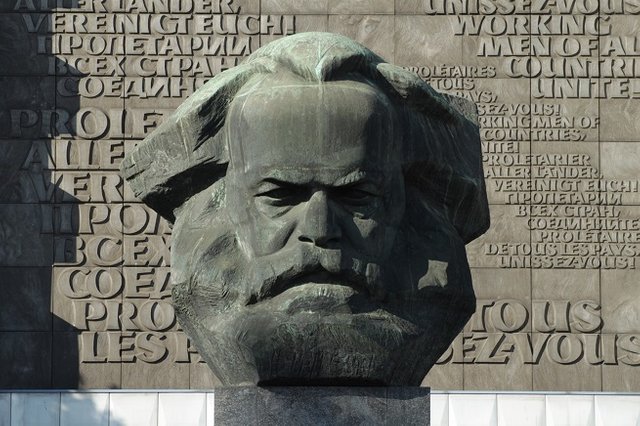Karl Marx and the destructive power of one utopia
Karl Marx, the first scientist in social science, was born in 1818 in Trier, Germany. His father was a gentleman and at seventeen, Marx joined the University of Bonn to study law. Later, he transferred to Berlin University, receiving his title of doctor in Philosophy from the University of Jena. As a young man, Marx studied Hegel's philosophy. In the sphere of social philosophy, Hegel opposes Locke's individualism and public contract theories, and returns to the Holistic, organisms of Plato's state superiority. Marx believes that Hegel's dialectics is crucial to the understanding of the economic forces that act in society. But Marx breaks hegelianism at a decisive point. While Hegel believes that the primary reality is ideal, Marx insists that this primordial is material. Marx's social philosophy is often called dialectical and historical materialism, although he himself has never used this phrase. Marx's materialism is related to the real life-span of the true people of the people trying to survive, not to the "false ideals" of intellectuals, poets and artists.
After Jena University, Marx has been engaged in journalistic activities and for some time has been editor of the Cologne "Reinische Zeitung". Because of the problems caused by his radical political views, he is forced to move to Paris. There he met Friedrich Engels and a personal and political friendship for a lifetime emerged between them. Although everyone is the author of several separate works, their intellectual cooperation is so tied that the works of the two can be seen as a joint achievement. However, Marx is considered to be the most significant and leading figure in this "union". After being expelled from France, Marx moved to Brussels. There he published witg Engels their most prominent work, the Communist Party Manifesto, which is the foundation upon which the Communist Party builds its ideology, and its influence extends to many countries - mainly in Europe, but also spread throughout the United States and Asia. Shortly after Marx's attempt to return to Cologne, he was expelled from there, then settled in London and remained there until his death in 1883. In London, Marx is somewhat engaged in journalistic activity, but his income is far from sufficient. Over the last 30 years of his life he relies on generous donations from Engels, who works to support Marx and his family, while at the same time Marx writes books on politics and economics. The first volume of "Capital" was published in 1867, and the other two volumes were compiled and published by Engels on the basis of Marx's notes and manuscripts.
When Marx died he still has no country to apply his ideas in practice. Later, however, his works are considered to be the basis of communism and modern forms of socialism. Communist regimes are established in many countries, including Russia and China. In a number of other countries, Marxist movements are emerging, seeking to seize power at the cost of rebellion, propaganda, and political assassination, and once they have achieved their goal, their governance is characterized by wars, violent repressions, and bloody purges. The dictatorial approach and the accompanying inhuman aggression are "justified" and even pledged by the founder of communist ideology, Marx, in his Manifesto. He emphasizes in several places that "the proletariat and" the achievement of their goals "need" despotic interference "and" forcible overthrow of the whole public order ". One hundred years after his death, Marx had more than one billion followers. This means a greater number of supporters than any other ideology has in both absolute numbers and as part of the population of the world. This has led many Communists to hope that the world will live the full triumph of Marxism. The change of society according to Marxism meant the absolute abolition of private ownership of the means of production. This was the first necessary step on the path of the "new world order". The state, the government, with its employees and laws, would die in the course of the changes. Communist society was not supposed to be crime, alcoholism, religion, exploitation, famine, or poverty. All funds would be directed to producing things that satisfy people's needs, and the distribution of these products would be reasonable and individual, rather than the dominant irrational market methods by which goods and services were distributed to capitalist society - "Everyone according to their abilities, for everyone according to their needs" is the simplest presentation of the ideology of Marxian philosophy.

Very informative post, The term "utopian socialism" was introduced by Karl Marx in "For a Ruthless Criticism of Everything" in 1843 (and then developed in The Communist Manifesto in 1848), although shortly before its publication Marx had already attacked the ideas of Pierre-Joseph Proudhon in Das Elend der Philosophie (originally written in French, 1847). The term was used by later socialist thinkers to describe early socialist or quasi-socialist intellectuals who created hypothetical visions of egalitarian, communalist, meritocratic, or other notions of "perfect" societies without considering how these societies could be created or sustained.
Nice post @godflesh, even after Marx was expelled France and move from one country to the other his ideology never change and even after his death he is still remembered for who he was and what he believed.
To listen to the audio version of this article click on the play image.

Brought to you by @tts. If you find it useful please consider upvoting this reply.
the carvings are incredible, it takes a high skill to make it